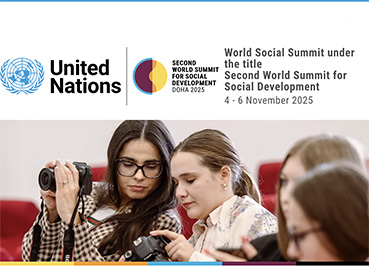The Political Declaration of the Member States for the Second World Summit on Social Development, convened by the United Nations General Assembly and to be held in Doha (Qatar) from 4 to 6 November, makes explicit reference to cooperatives and the social and solidarity economy (SSE) on several occasions. The text was approved following an intergovernmental negotiation process held at the United Nations headquarters in New York on 9 September.
Pending its formal adoption at the Doha Summit, the Political Declaration expressly recognizes that the social and solidarity economy can play a fundamental role in eradicating poverty, promoting social inclusion, and driving social transformation, thereby contributing to the goal of leaving no one behind and to the achievement of the 2030 Agenda and its Sustainable Development Goals.
The text also expresses support for entrepreneurship through the creation of an enabling environment, particularly for women, persons with disabilities, older persons, and youth, by encouraging innovative mechanisms, microenterprises and small and medium-sized enterprises (SMEs), cooperatives, and the social and solidarity economy.
In the same vein, the Doha Political Declaration includes a renewed commitment to the Copenhagen Declaration and Programme of Action, which made explicit and repeated reference to the economic and social actors now encompassed within the SSE framework.
This is evidenced by ten specific references to cooperatives, linked to quality employment, poverty reduction, rural development, and financing; nine references to community organizations associated with service delivery, social protection, and participatory planning.
In addition, there are six mentions of associations, particularly in the context of training and skills development; five references to self-help groups or schemes, mainly related to community development and finance; and one further reference to mutual support groups, listed among grassroots institutions that foster social integration.
The Second World Summit on Social Development
The United Nations General Assembly, through Resolutions 78/261 and 78/318, decided to convene the Second World Summit on Social Development, thirty years after the historic 1995 World Summit for Social Development in Copenhagen.
Convened at the level of Heads of State or Government, the summit seeks to address shortcomings, renew commitment to the Copenhagen Declaration on Social Development and the Programme of Action, as well as their implementation, and advance the implementation of the 2030 Agenda.
Political Declaration of the Member States for the Second World Summit on Social Development







